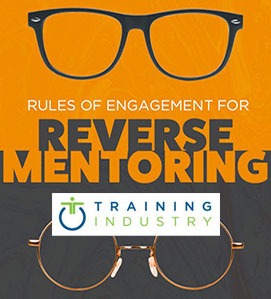Press Feature
 Rules of Engagement for Reverse Mentoring
Rules of Engagement for Reverse Mentoring
By Laura Francis
Published in Training Industry
September/October 2019 issue
Reverse mentoring is growing in popularity. In this article by Laura Francis in Training Industry, discover five rules of engagement that will help mentees and mentors participate in reverse mentoring with confidence, care, and consideration.
*************************
Article Sneak Peek:
ManpowerGroup predicts that the workforce will look decidedly younger in 2020, with a generational picture that breaks down to 6% baby boomer, 35% Gen X, 35% millennial and 24% Gen Z. That means that more than half of the workforce will be younger than 40 in 2020.
Organizations are scrambling to find ways to attract and retain these young workers. Many companies turn to traditional mentoring to help develop their young talent – and for good reason. Deloitte’s 2016 Millennial Survey found that younger employees intending to stay with their organization for more than five years were twice as likely to have a mentor. Additionally, DDI’s Global Leadership Forecast 2018 report showed that mentoring can reduce turnover and create higher leader quality overall.
Yet, traditional mentoring only tells part of the story. Many innovative organizations are exploring reverse mentoring: a method that takes mentoring and flips it on its head.
Continue reading “Rules of Engagement for Reverse Mentoring” here.








